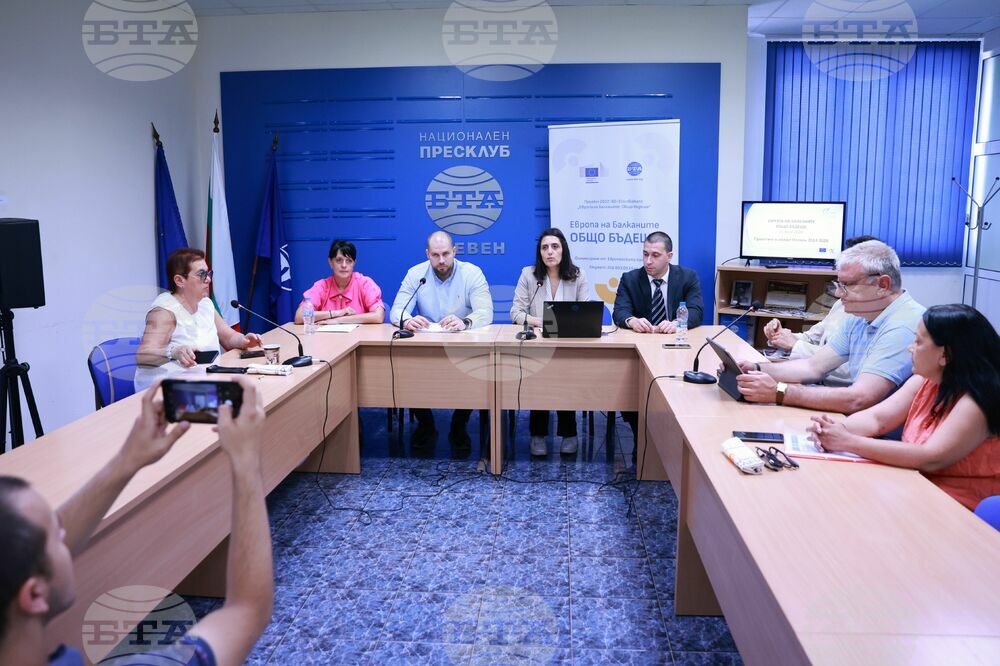site.btaParticipants Discuss EU Funded Projects in Pleven at BTA's "Europe in the Balkans" Conference


Pleven hosted a local conference under BTA's project "Europe in the Balkans: A Common Future" on Tuesday. The conference brought together representatives of the state and local administration and the municipal information centre, as well as non-governmental organizations. The participants discussed results achieved thanks to the projects backed by the EU cohesion funds in the 2014-2020 programming period and new aspects in the 2021-2027 programming period.
Pleven regional governor Nikolay Abrashev emphasised the importance of EU funded projects for the region. "In Pleven, the pace is slower and we have to take advantage of every single opportunity, because the city has a need and we have the will", he said. According to him, it is important that the Municipality takes advantage of all its mechanisms, because it has the most options to apply. He pointed out that cooperation between all institutions, state and local authorities, is needed to move in the right direction.
"We are working to make Pleven a green and accessible city", said Prof. Ivan Malkodanski, Pleven Municipal Council chair. He added that in order to achieve this goal, they are using the opportunities under the Operational Programme Environment 2021-2027 and preparing a project for the greening of the city. According to Malkodanski, during this mandate, the Municipality is betting on the modernization of the material and technical base of educational institutions. Another priority in the work of the team is for Pleven to be an active and integrated city. He cited the 2021-2027 Regional Development Programme, where a high degree of project readiness is prepared under the Integrated Urban Development Priority.He also noted that the administration's efforts are aimed at financing three important projects for Pleven, the first of which is the Sports Hall, a facility for 3,200 people and 358 parking spaces, with opportunities for various sports, including volleyball, tennis, fencing and basketball. The construction will be worth BGN 30 million.
"Everything which is necessary is being done to ensure that the opportunities provided by the 2021-2027 programming period are fully met by us to solve the identified needs for our city" said Kamelia Gornenska, head of the Monitoring and Control of Programmes and Projects at Pleven Municipality. She pointed out that according to the Plan for Integrated Urban Development, over BGN 70 million are planned for Pleven Municipality. 15 project proposals have been submitted by the interested and eligible parties within the specified period under the Plan, with a total value of over BGN 162 million. Three project intentions of Pleven Municipality are part of the submitted proposals, Gornenska added. A general plan for the organization of traffic will also be developed, together with the Plan for sustainable urban mobility. One of the important project ideas is to withdraw the traffic flow from the central part of the city, with the aim of faster and easier access to the historical core of the city.
Tihomira Lazarova, a consultant at Enerchemical EOOD, said that the company, which employs about 50 people, is a leading enterprise for the production and recycling of metalworking and metalcutting machines with over 40 years of history. In recent years, the company has reoriented its activity as a production of details and elements intended for enterprises in various industries such as agriculture and the construction sector. "With the help of the successfully implemented projects, the company has modern and high-tech equipment", said Lazarova. According to Lazarova, the working environment of the workers has also been improved through EU funding.
Hristo Taslakov from the Mechi chal - Rozhen Association presented a project part of the Interreg V-A Greece-Bulgaria 2014-2020 Cooperation Programme, in partnership with the Democritus University of Thrace, worth EUR 620 thousand, which was implemented by his association. The project aimed at creating a more favourable environment for small and medium-sized companies on both sides of the border. It covers companies from nine priority sectors, including food and beverage processing, agriculture, construction, raw materials and tourism. "Our task was to create a database with everything that can help or hinder business in the region, for example banks, municipal and state regulations, funding opportunities under European projects, partnerships, and so on," noted Taslakov, adding that over 60 meetings have been held and over 9,000 people have participated in these meetings.
BTA's Europe in the Balkans project is supported by the European Commission. It aims to foster a better understanding of the role of cohesion policy in the Balkans; to raise awareness of projects funded by the EU through the Cohesion Funds; promote dialogue on the results of the projects at local level and boost civic participation in issues related to cohesion policy.
The project is funded with EUR 348,871. To achieve the project's aims, BTA is using a media mix and expects to reach out to between 700,000 and 1 million people in Bulgaria, Romania, Serbia, North Macedonia, Greece, and Turkiye.
The series of conferences under the project was launched on December 20, 2023 in Sofia. The programme for 2024 includes discussions in the cities of Blagoevgrad, Burgas, Varna, Vidin, Vratsa, Gabrovo, Dobrich, Kazanlak, Kardzhali, Kyustendil, Lovech, Montana, Pazardzhik, Pernik, Pleven, Plovdiv, Razgrad, Samokov, Silistra, Sliven, Smolyan, Sofia, Stara Zagora, Targovishte, Haskovo, Shumen, Yambol, Kardzhali, Vratsa and Montana, as well as cross-border conferences in Belgrade, Bosilegrad, Bucharest, Edirne, Skopje and Thessaloniki.
/NF/
Additional
news.modal.image.header
news.modal.image.text
news.modal.download.header
news.modal.download.text
news.modal.header
news.modal.text





















